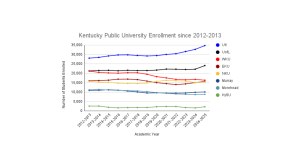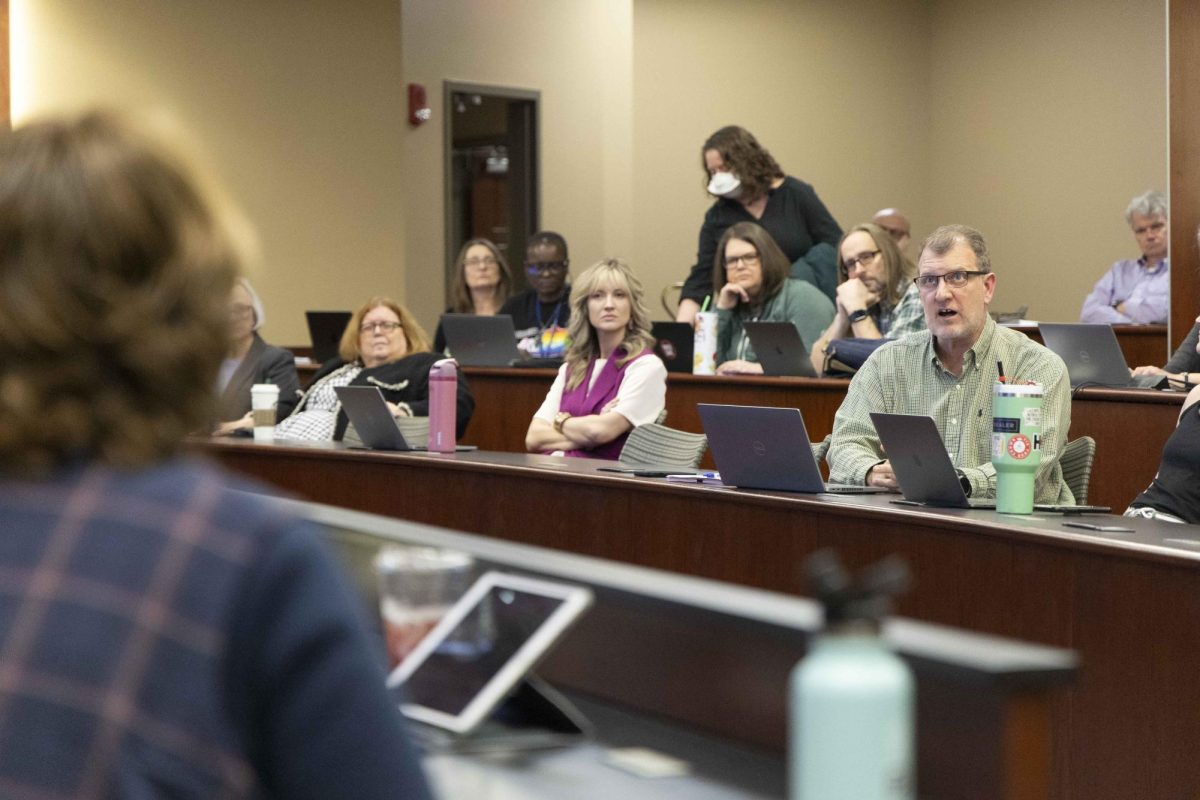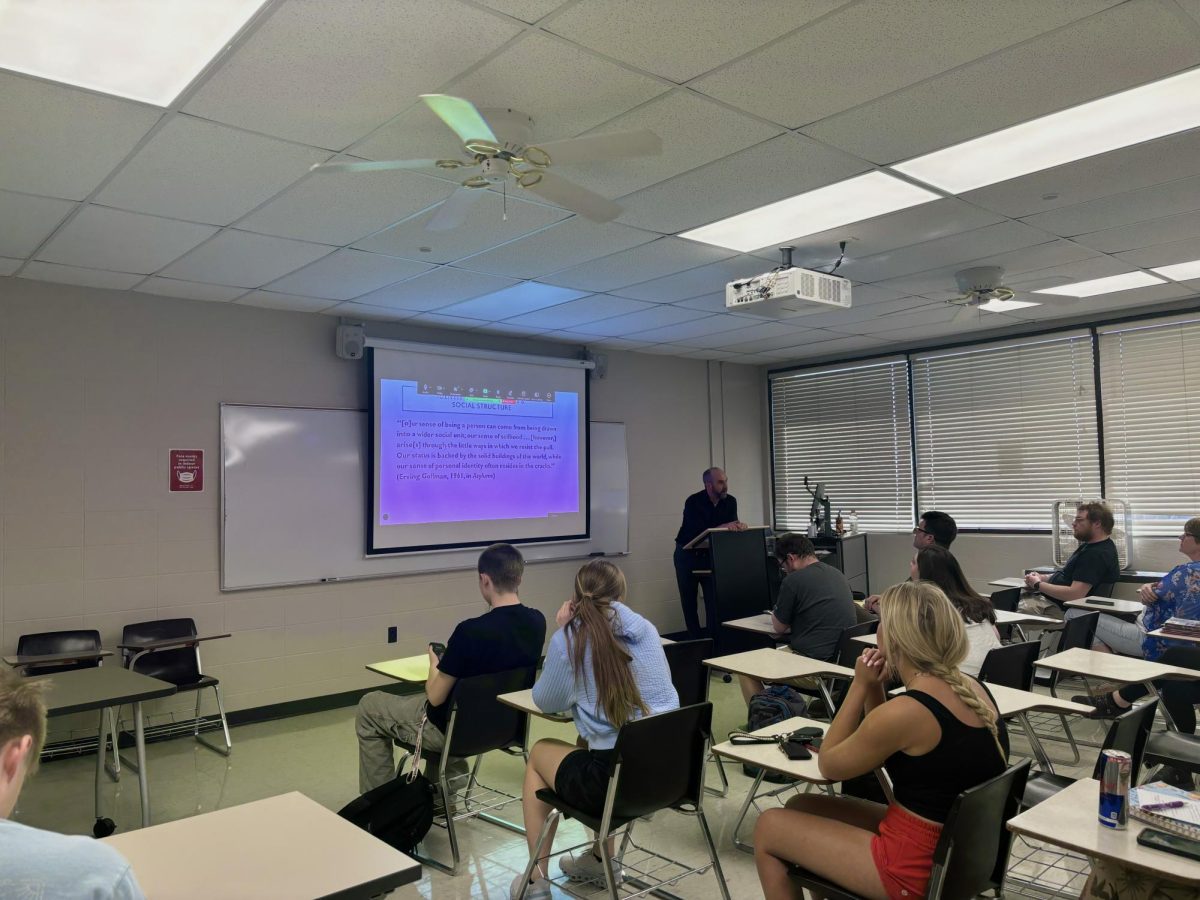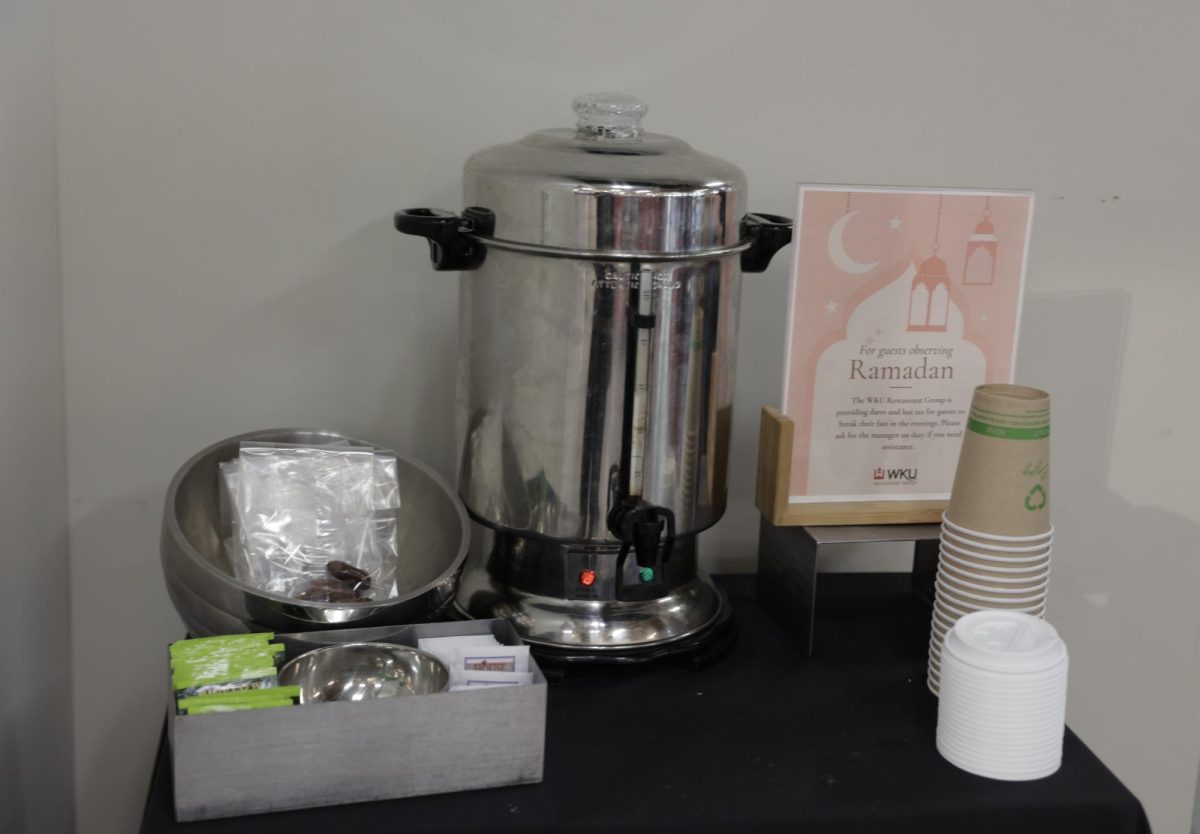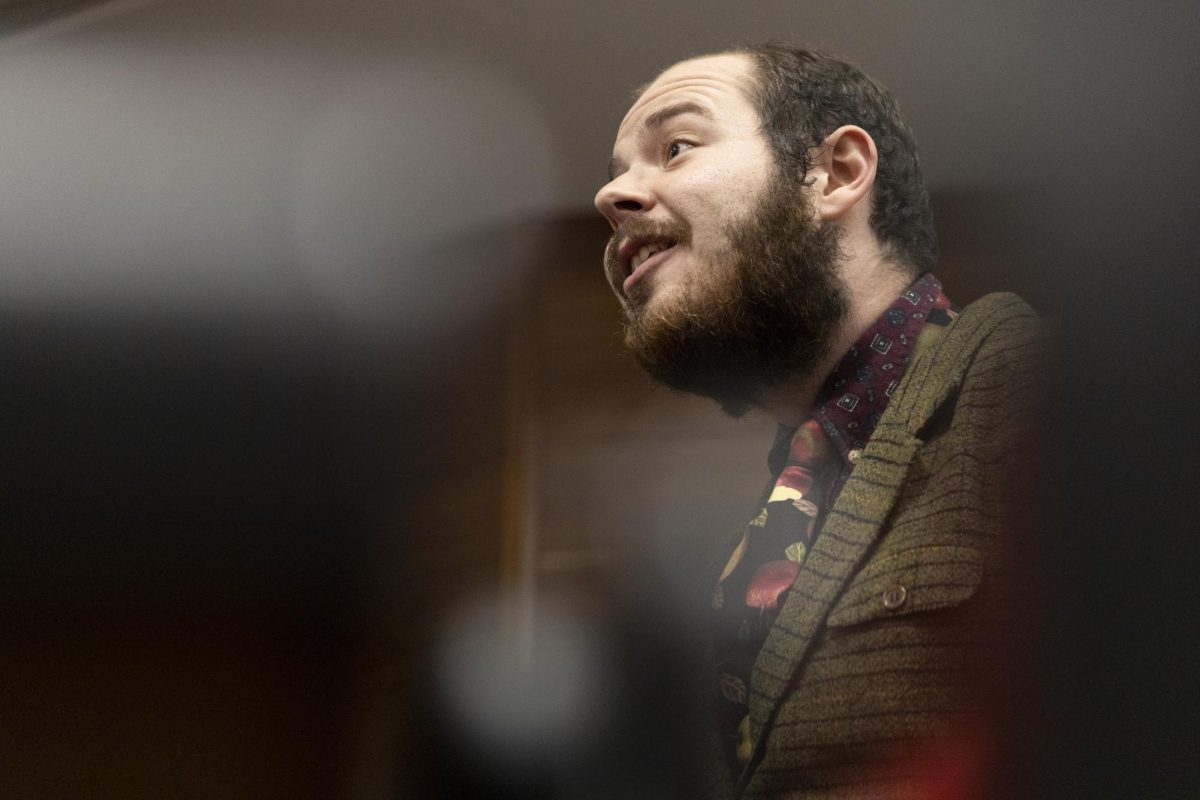SGA president details harassment experience
April 24, 2018
Editor’s note: This story contains profanities
“Go fuck yourself.” The three words were scrawled in blue ink on the back of a Chick-fil-A receipt and placed behind the windshield wiper of Andi Dahmer’s car.
An anonymous note like this would likely give anyone pause for concern, and it did her as well. Dahmer called the WKU Police to Minton Lot, where her car was parked, Friday, Feb. 9, at 7:29 p.m., according to a police report.
This incident was not the first time the Student Government Association president and student regent said she faced harassing behavior or had profane language thrown her way.
Over the course of the fall 2017 semester and this spring, Dahmer contended that several members of SGA had cursed at her in her office, called her derogatory names and had anonymously exchanged group messages with each other wishing her physical harm. All this resulted in her feeling unsafe on campus. The note, she said, was the point where months of ongoing insults suddenly made her fear for her safety.
“They knew what dorm that I stayed in,” Dahmer said. “They knew where I parked my car and they had identified my car and so they could find me. I think that was the scariest part. That’s when I really started fearing for my life on this campus.”
Ann Coffey, Dahmer’s mother, said she also grew concerned for her daughter’s safety.
“We felt very threatened for her because we thought that someone was going to either hurt or kill her,” Coffey said, referring to herself and Dahmer’s father. “There were many nights that Andi did not feel safe on campus.”
As a result of the note, Dahmer spent two weeks not staying in her residence hall. She used the campus police escort service to walk to and from her night classes and relied on groups of friends to walk with her.
After discovering the note and filing the police report, on Feb. 9, Dahmer confided in her residence hall director about what she had experienced. She said her residence hall director then reported the incident to WKU’s Title IX office. Residence hall directors are mandatory reporters and must report such incidents if they are told.
While the note was one of the more direct messages she received, Dahmer explained, this behavior toward her had been taking place both inside and outside the SGA Senate chambers for several months.
Deep discord in SGA
Dahmer contended eight members of the Senate took part in a GroupMe message group called the “Justice Friends.” The Herald has chosen not to publish the names of the students involved, but confirmed that six of the eight are part of SGA and used their real names in the message group. Two used the nicknames “Batman” and “Aquaman,” and by the substance of their comments, indicated they also were part of SGA.
Five of the people were male and three female. According to the SGA website, there are 38 student members of the Senate, 23 men and 15 women.
The Herald reached out to the students for verification of their involvement and additional comment, but they either did not verify their involvement, declined comment or did not respond.
Dahmer provided the Herald with screenshots she had obtained of these messages.
One message read: “I could punch that bitch and her lawyer in the face.”
Another read: “I hope she gets cancer and catches on fire.”
And another read: “Could she be any more of a c— like god damn.”
Dahmer said her family met with a lawyer following people coming into her office and cursing at her, creating what she said she felt was an unsafe work environment for her within SGA. She also said additional legal counsel was sought after receiving the note so she could determine ways to feel safer on campus.
Dahmer said there were people in the group who more or less watched the messages go by and didn’t engage in the exchange of violent language and behavior, but this was also unacceptable to her.
“If you stay silent, if you refuse to act, then you’re complicit in those actions … their silence was agreement, and I think that’s what bothered me the most,” she said.
Previously, Dahmer attributed tensions within student government as developing from partisan ideologies that have been brought into the Senate — although SGA is supposed to be a nonpartisan organization. That created a more divisive atmosphere among senators, she said.
Dahmer still believes ideological differences may have had a role in what she experienced. She said her views on LGBT and immigrant rights had been interpreted as her having an inherently liberal ideology, so others might have concluded she holds prejudice for those with more conservative viewpoints.
However, Dahmer said, she couldn’t point to any one specific moment that would have brought about the alleged harassment.
Several SGA senators involved in the group messages would refer to Dahmer and other executive board members as “bitches” while in the SGA office. SGA’s executive board has seven members; six are women.
SGA Director of Academic Affairs Emily Houston said derogatory terms like “bitch” and “c—” were only directed toward the female executive board members in the office.
Houston said Dahmer received the brunt of the negative behavior from SGA senators.
“I really do think that it comes down to gender because there is not many other factors at play,” Houston said. “I think it really came down to her being a woman.”
Multiple SGA senators involved in the threatening messages, but not all of them, often gathered at one particular desk in the SGA office, located directly in front of Dahmer’s office. Interviews with SGA members confirmed this.
SGA Executive Vice President Savannah Molyneaux said she believed they did this to intimidate Dahmer.
“Whenever I saw them waiting outside her door, I would close my door because I felt scared too,” Molyneaux said.
Dahmer said as many as six SGA senators would be waiting outside her door at the desk at one time.
“One of the boys specifically would sit outside of my office and wait for me to open the door just so he could look at me or stare at me,” Dahmer said. “I think that the intention was to be intimidating.”
“Boys will be boys” mentality
Dahmer said she met with Charley Pride, WKU’s Director of Student Activities and then the adviser to SGA, about other problems on a few occasions, but not specifically the messages. She said this was met with little success.
For instance, Dahmer said back in August there were instances of male SGA members declining to refer to female members by their proper titles. From there, things progressed to people coming into Dahmer’s office without permission and people cursing at her. Dahmer said Pride did little to remedy the situation.
“He sort of chalked it up to this ‘boys will be boys’ mentality and didn’t try to step in,” Dahmer said.
Pride was contacted for comment, but declined to respond.
SGA Director of Public Relations Amy Wyer said she and other executive board members, including Dahmer, felt uncomfortable meeting with Pride about these issues.
“It felt like that wasn’t an option,” Wyer said, also saying Pride was seen numerous times meeting with several of the SGA senators who were involved in the alleged harassment.
Dahmer said she was uncomfortable going directly to Pride about what she was experiencing because of past meetings she had with him. On Jan. 23, Pride told Dahmer there was a group of senators who intended to impeach her, but she said he took no action to mediate this.
In mid-March, Pride resigned from his position as adviser of SGA. When the Herald requested a comment from Pride, he said he was currently “ex-officio” for SGA and declined to comment further. Ex-officio is typically used to refer to a person who is a non-voting member of a committee by virtue of holding another office.
According to email correspondence obtained through an open records request, Pride has also stepped down from the Spirit Masters advisory board.
Wyer said Pride did not step in to stop the negative behavior.
“He was never very helpful,” Wyer said. “It felt like there wasn’t anything we could do.”
On March 20, Dean of Students Lynne Holland and Assistant Director of Student Activities Randall Bogard sat in on the Senate meeting in place of Pride.
Dahmer said she was told by Holland that she and Bogard were now the co-advisers to SGA. Other SGA members confirmed that Pride has stopped attending Tuesday meetings and Holland and Bogard now attend.
The Herald reached out to Holland regarding her position as one of the new SGA advisers with Bogard in place of Pride, but she did not respond in time for publication.
Going to the Title IX office
Dahmer’s experiences were put before WKU’s Title IX office when her residence hall director, following university policy, reported Dahmer’s concerns.
Dahmer said she had her first meeting with Title IX officials on Feb. 13.
Title IX is a federal civil rights law, part of the Education Amendments of 1972. Simply stated, Title IX prohibits sex discrimination in universities that receive federal funding (the vast majority of schools). The scope of Title IX was expanded by former President Barack Obama to mandate universities combat sexual harassment, including sexual violence.
Additionally, Title IX requires schools to prevent and remedy gender-based harassment, which is what Dahmer claimed she has experienced. According to the Department of Education, gender-based harassment is “unwelcome conduct based on a student’s sex, harassing conduct based on a student’s failure to conform to sex stereotypes.”
Dahmer said she met with Michael Crowe, director of the Office of Student Conduct and a Title IX investigator; Melanie Evans, coordinator of Judicial Affairs in the Office of Student Conduct; and Andrea Anderson, director of Title IX and assistant general counsel.
The Herald reached out to Crowe, Evans and Anderson for comment and additional questions, as well as Joshua Hayes, director of Equal Employment Opportunity and Title IX deputy, and Deborah Wilkins, general counsel. The Herald received no response from Crowe, Evans or Anderson.
Hayes declined to take part in an interview.
“From my understanding, various representatives of the WKU Herald have already requested and conducted interviews with other Title IX campus officials. It is also my understanding that the upcoming article(s) will not provide an authentic, ethical, and/or truthful conveyance of information; therefore, I will not be participating in this process,” he said in an email.
Wilkins declined an interview based on an interview former Herald staff member Nicole Ares conducted with Anderson in early 2017 and an off-the-record meeting Wilkins gave to the Herald editorial board in February 2017. She also said they would not be providing interviews or statements to the Herald while litigation is pending.
WKU sued the Herald in February 2017, after WKU denied an open records request by Ares in November 2016 for records concerning sexual misconduct allegations against employees at the university. WKU has acknowledged there had been 20 investigations since 2013 with six cases found to be in violation of university policy.
The lawsuit is ongoing. Oral arguments took place in early April.
During her meeting with Title IX officials, Dahmer said she requested to record the proceedings with her phone, as recommended by her attorney, but was told it was unnecessary for her to record because the Title IX office would be recording. She ended up not recording. Kentucky is a one-party consent state for recording conversations, meaning you can legally record a conversation as long as you’re a party in the conversation.
On Feb. 16, Dahmer approached Evans and requested a copy of the recording of her meeting, which Dahmer said Evans denied her.
“They said that they ‘don’t distribute those,’ and I was totally denied,” Dahmer said. “There were no further questions. It was just a flat refusal, which really it resulted in my distrust.”
Dahmer took a friend with her, who works in Downing Student Union but requested not to be identified, when she went to request the copy. The friend confirmed that Evans denied Dahmer’s request for her recording.
Evans did not respond to the Herald for comment.
Attorneys for WKU stated in court earlier this month that if a student was to request his or her own Title IX documentation, then the university would release it to that student.
“If a student, who has filed a Title IX Complaint, wishes to release information and/or documentation related to the investigation, then he or she may do so on his or her own volition,” WKU asserted in a brief filed with the Warren county Circuit Court as part of the WKU vs. Herald lawsuit.
Dahmer said her experience with the Title IX office caused her to distrust the office.
“It was also really frustrating to me because it was almost like they doubted the credibility of what I had experienced, even though I had lots of evidence to show them with the messages and everything that I experienced, and it was also hurtful because they asked me what I had done to cause the situation, which was just victim blaming,” she said.
Kara Lowry, SGA administrative vice president, went to the Title IX office as a witness on Dahmer’s behalf, and she went with Dahmer to receive the final decision on her complaint.
“She wanted me to go because she wanted somebody there to support her because she didn’t really know what they were going to say,” Lowry said.
Ultimately, Dahmer said she was told her case did not constitute a violation of Title IX because it did not meet the legal standard for harassment.
Dahmer said Anderson explained to her that to have actionable harassment it has to be “objectively offensive, severe and pervasive,” and that Anderson was unaware of a situation in which words alone have risen to the level of “actual harassment.” Anderson told Dahmer for words to reach that level they would have to be extremely pervasive or persistent.
Dahmer confirmed that while her case did not rise to the level of Title IX, her complaint was processed by the Office of Student Conduct. Not by her choice but the university. Dahmer believes her case should have been handled by Title IX.
The Office of Student Conduct handles cases of students who are alleged to have violated the Student Code of Conduct.
It was through the Office of Student Conduct that Dahmer had two No Contact orders issued against two male members of the eight “Justice Friends” students, who she said harassed and threatened her.
A No Contact Order is a preventative measure the Office of Student Conduct can issue when reports have been received of alleged violations of the Student Code of Conduct. These orders are also issued “even in cases where a respondent has not been found formally responsible for violating University policy,” according to a Student Conduct webpage.
While Dahmer said she is aware of the Office of Student Conduct’s involvement, she declined to disclose which students have been involved with the Office of Student Conduct and who, if any, faced repercussions. Disclosing that specific information would violate the rights of other students, and only they themselves could disclose it.
One student who was allegedly involved divulged to the the Herald that “there was an ongoing investigation with student conduct, and I was found not guilty, and no punishment was issued.” However, another who was allegedly involved with the messages said they were never part of any investigation by the Office of Student Conduct.
Crowe did not respond for comment about who, if anyone, from SGA was involved in an investigation by the Office of Student Conduct.
A lasting impact
Dahmer said her experiences over the last few months have left an impact on her and hindered her from being able to accomplish what she wanted to as SGA president.
“It’s been so hard to accomplish the agenda that I set out to, that I was elected to do, and write all the legislation that I really wanted to,” she said.
Others spoke about how the experience affected Dahmer in her day-to-day life, especially after finding the note on her car.
“She had to change a lot of her routes to make sure that somebody could always walk her wherever she had to go, which is really inconvenient, and it’s really awful that she had to change what she has to do when it’s other people that are threatening her,” Molyneaux said.
There were also changes in her personality and eating habits that members of the executive cabinet pointed towards.
“I know there are days that she literally cannot keep any food down,” Houston said. “She just was running on fumes because if she tried to eat, it came right back up because she was so stressed about all of this. Regardless of your politics or your opinions, I just don’t think that anyone should want someone to experience that.”
Coffey, Dahmer’s mother, said the stress of the situation really affected Dahmer.
“She would have no appetite because she was too scared to go out by herself to grab something to eat, or she would become very nauseated if she tried to eat,” Coffey said. “She also had trouble sleeping because she truly felt like her life was in danger, and I did too.”
Coffey said although she and Dahmer’s father chose WKU was for its “exemplary” Title IX record, Dahmer’s experience has also caused her to distrust the Title IX office and the administration at WKU.
“I am full of disappointment,” Coffey said. “To think that they would treat a student this way, especially someone who has brought so much positive acclaim to Western, and to not believe her, it’s really a sad thing.”
Dahmer decided to not seek re-election for president for the 2018-19 year, but she said her decision was not made because she’s “cowering in fear” of what she experienced. Rather, she said, she hopes to evoke change in other ways.
“Our university must be better,” she said. “In a truly student-centered environment, all students must feel safe and respected.”
Correction: A previous version of the story referred to the GroupMe as “Justice League” it is actually “Justice Friends.” The Herald regrets the error.
Editor-in-chief Andrew Henderson can be reached at 270-745-5044 and andrew.henderson@wku.edu. SGA reporter Nicole Ziege can be reached at 270-745-6011 and nicole.ziege825@topper.wku.edu.








